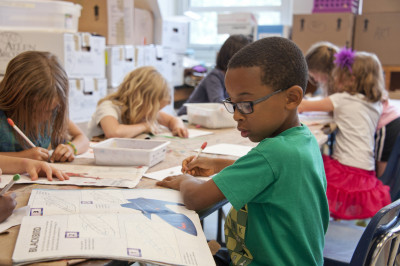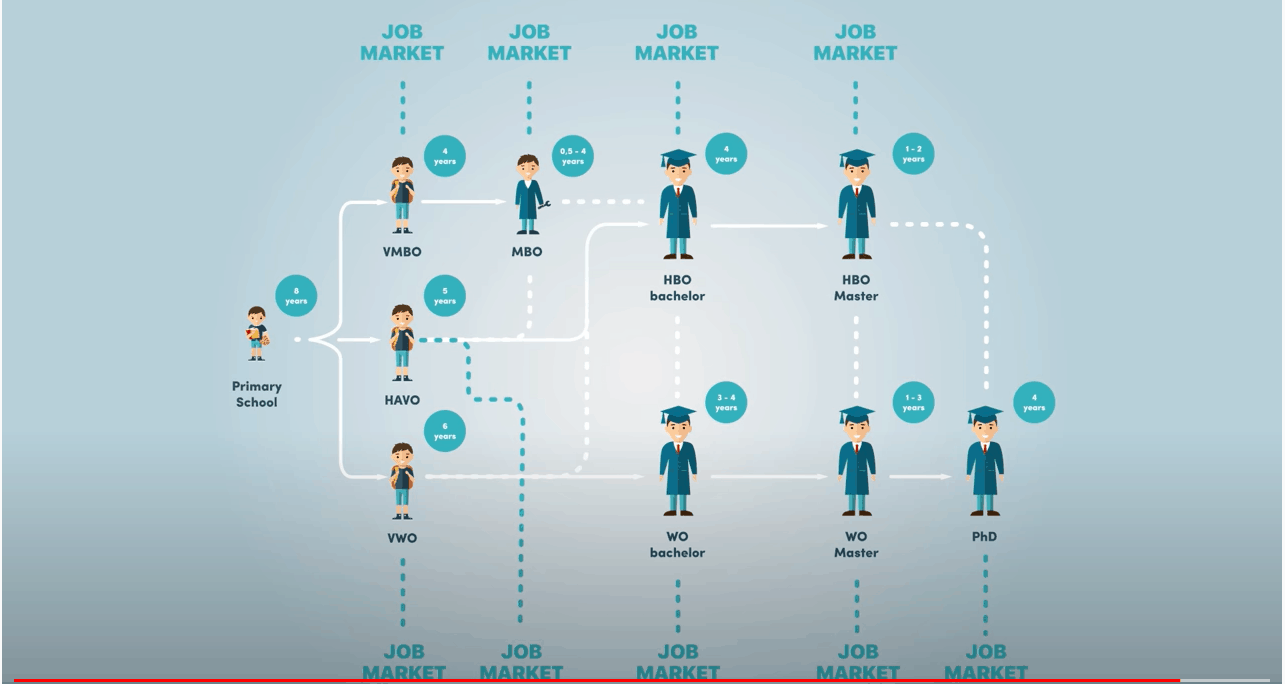We all had a lot of questions about school when we arrived in the Netherlands with our child: where do I enrol him in school? at what age does the child start school? Dutch or international school? what documents do I need to enrol my child? is it a good, suitable school for my child? how will the child adapt and integrate into the new Dutch school, culture and life?
To answer these questions, we are trying to produce a useful guide on "Children's education in the Netherlands" to explain:
- such as structured Dutch education system
- what you need when choosing a suitable school for your child (when and how to enrol your child in school, necessary documents)
- useful things to know about the education Dutch: school program; school holidays and holiday dates; start of the school year; birthday celebration at school
- educational philosophies
- participation in extracurricular activities and club membership (music, sport, Dutch language training)
- adaptation and integration in a new education system
- various situations: what do you do if the child is "special"? what if the child is beaten up at school?
The guide will be structured into several articles that will provide the information you need about the school. This information is not exhaustive, it can be updated and completed. We will try to help you with any questions you may have along the way, so please do not hesitate to ask questions.
-
The structure of the Dutch education system at a glance
The Netherlands offers parents the choice of how their child is brought up. You will find a wide range of options to consider when enrolling your child in the education system.
The Dutch education system is structured in 4 main parts.
- Nursery and kindergarten(kinderdagverblijf, voorschool): from 0 years - 4 years

Before children reach primary school age, they could go to nursery (kinderdagverblijf) or preschool (voorschool) or a combination of the two.
Daycare is intended for children from about 10 weeks to 4 years. Most nurseries offer full-day contracts for 1 to 5 fixed days a week.
In most cities, preschool starts at age 2 and are offered an average of 15 hours per week for three days. Typically, preschool is more structured than nursery and prepares pre-school children for primary school in a playful way according to a designated curriculum. The focus is on Dutch language acquisition, social skills and motor skills.
If both parents work (or only one parent works in a lone parent family), they should be entitled to a tax reduction (childcare allowance kinderopvangtoeslag) for day care costs through the tax authorities. This amount depends not only on the income of both parents, but also on how many hours are used for childcare.
Also in the case of pre-school, working parents can claim tax relief. If only one or neither parent works, they will receive a subsidy from the municipality (gemeente) towards the preschool costs.
-
Primary education (basisonderwijs): from 4 years - 12 years

Most children start primary school (called basisschool in Dutch) the day after the 4th birthday, no matter when it is during the year. From the 5th birthday, all children are obliged to go to school (leerplicht).
Primary school has 8 classes, from group 1 (age 4) to group 8 (In primary school children learn basic skills such as reading, writing and arithmetic/mathematics, English language and geography.
In the Netherlands, there is a distinction between public schools (openbare school) and special schools (bijzondere school). Public schools are funded and run by an independent foundation that was originally set up by the government. They are always non-religious. About two-thirds of the population attend special schools, which have their own board and often follow specific religious or pedagogical principles. Religious schools are usually quite moderate in terms of religion and are open to religious children and those of a different religion. However, this varies from school to school.
Students from group 8 take a compulsory final test (examples Cito, IEP, Route 8) which takes place in April. Enrolment for secondary school (high school) then takes place in March. The primary school gives a recommendation (advice). The results of the test and the recommendation, as well as the pupils' and parents' own preferences, determine which form of education the pupil should follow at secondary school. In this system, the school's recommendation usually outweighs the test result, unless the test result places the pupil in a higher curriculum type than the recommendation.
-
Integration school or school for newcomers (Nieuwkomers school, taalklas or taalschool): from 6 years - 12 years
Children between 6 and 12 years of age who are newcomers to the Netherlands, who do not speak Dutch and who want to attend a normal Dutch school, usually start with the integration school or newcomer school. The courses in these schools focus on learning the Dutch language and familiarising children with Dutch culture, with the aim of them continuing in regular Dutch or bilingual education after one year.
Like many aspects of Dutch education, the way integration schools operate differs from town to town. So-called 'taalklas' (language classes) usually accept children from the age of 6, but in some towns, language classes accept younger children.
Sometimes the integration school is a separate school and sometimes it is part of the main school. Separate schools sometimes work with mainstream schools, e.g. children will attend taalklas 4 days a week and in their future mainstream school 1 day a week.
-
International Transition Class (ISK international schakelklas): from 12 years old
Children of secondary school age (12+) who do not speak Dutch also have a transition class, this is called ISK = internationale schakelklas (international transition class).
The options and systems differ from city to city and, unfortunately, so does the name. Some cities use the term ISK for what other cities call "taalklas".
The best approach would be to contact the school you want your child to attend and ask them how it works in your town and what they would recommend.
-
Kopklas (link year between primary and secondary school)
Does your child have the ability to do VMBO, HAVO or VWO, but at the end of primary school their command of Dutch is still not good enough? In this case, the right place for your child could be a link year (bridge class) between primary and secondary school known as kopklas (Kopklas is in a secondary school building, but administratively the child remains in primary school. Children stay in the kopklas for one year. Pupils work on homework in all subjects, but the emphasis is on improving their knowledge of Dutch. Their arithmetic/mathematics must be at an appropriate level from the start and they will maintain it throughout the year. The effect of the link year is to raise their recommended level so that they can move on to the type of secondary education that best suits their abilities. Pupils follow the secondary school timetable and can use the multimedia centre and take PE lessons. Pupils are enrolled in kopklas through primary school. They take an entrance test to see if it's right for them.
- LearnțSecondary education (voortgezet onderwijs): from 12 years - 16/17/18 years
Basically, there are three levels of secondary or high school education, which are known by the acronyms VMBO, HAVO and VWO.
VMBO - is preparatory secondary vocational education, which usually lasts 4 years and is followed by MBO
HAVO - upper general secondary education, lasts 5 years and is followed by HBO (Hogeschool / University of Applied Sciences)
VWO - pre-university education lasts 6 yearsand students can continue at university WO (Wetenschappelijk Onderwijs)
-
Higher and further education: from 18 years old
- MBO (upper secondary vocational education and training / Middelbare Beroeps Onderwijs)
MBO courses are professionally oriented. Many students who have successfully completed VMBO at secondary school continues to make MBO. An MBO course lasts between 1 and 4 years, depending on the level: there are MBO2, MBO3 and MBO4 courses. Students can then enter the labour market; those who have completed an MBO4 course can continue studying at the HBO.
- HBO (university of applied sciences / Hoger Beroeps Onderwijs)
A diploma MBO, HAVO or VWO qualifies students for admission to HBO. Geared towards professions in specific fields, HBO consists of a bachelor's degree for 4 years. Students with a HBO bachelor's degree can continue to study for a master's degree; however, for this you usually have to first follow a so-called pre-master course, which normally lasts a year.
- WO (university research / WO Wetenschappelijk Onderwijs)
A diploma VWO qualifies students for university admission WO. In the Netherlands, this is research-oriented higher education. WO consists of a bachelor's degree (duration: 3-4 years) and a master's degree (duration: 1-3 depending on the course). Dutch universities offer a large amount of programmes in English, especially at Master's level.

In the next article "Education in the Netherlands. Part 2 School Enrolment", we'll go into more detail and share the steps you need to take to find the right school for your child in the Netherlands.
Useful references and links:
https://en.wikipedia.org/wiki/Education_in_the_Netherlands
https://www.iamsterdam.com/en/living/everyday-essentials/dutch-education-system/primary-school
https://www.iamexpat.nl/education/primary-secondary-education/dutch-school-system
https://www.expatica.com/nl/education/children-education/
https://www.expatica.com/nl/education/children-education/dutch-education-system-100816/#Expats
https://www.rijksoverheid.nl/onderwerpen/kinderopvangtoeslag

3 Comments
Doina Velican
Excellent article!!! Congratulations to all who put their efforts into this article!!!
Cristina
Good article. It can also be mentioned gymnasium. And categorically gymnasium. Have a nice day Cristina
Diana
8th graders take the exam in April but register for high school in March?